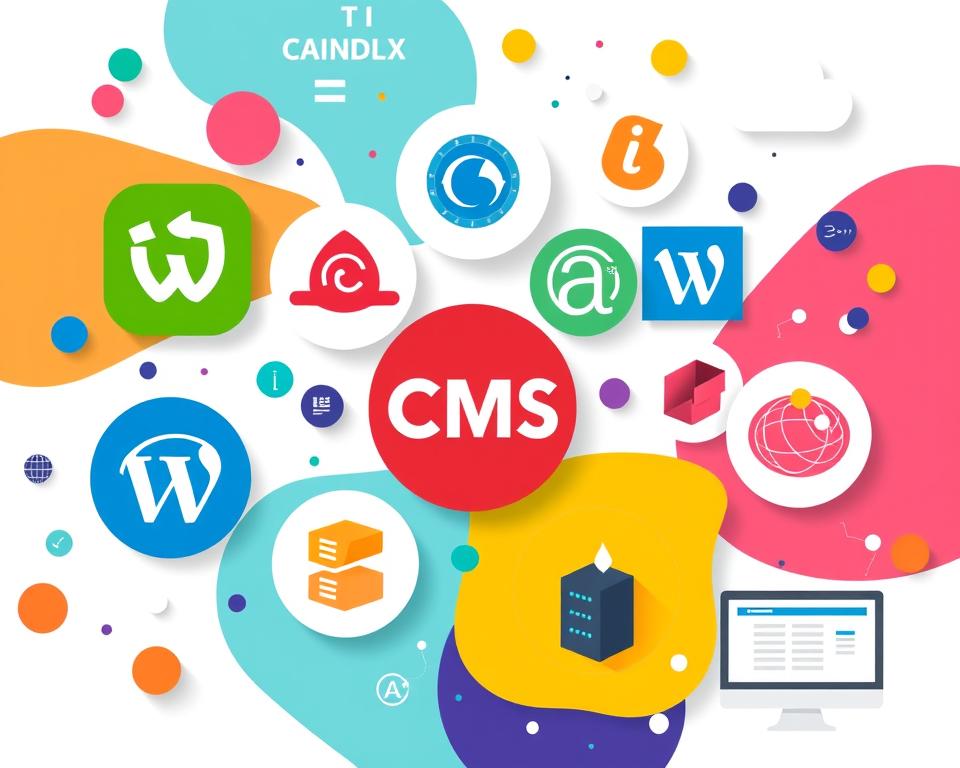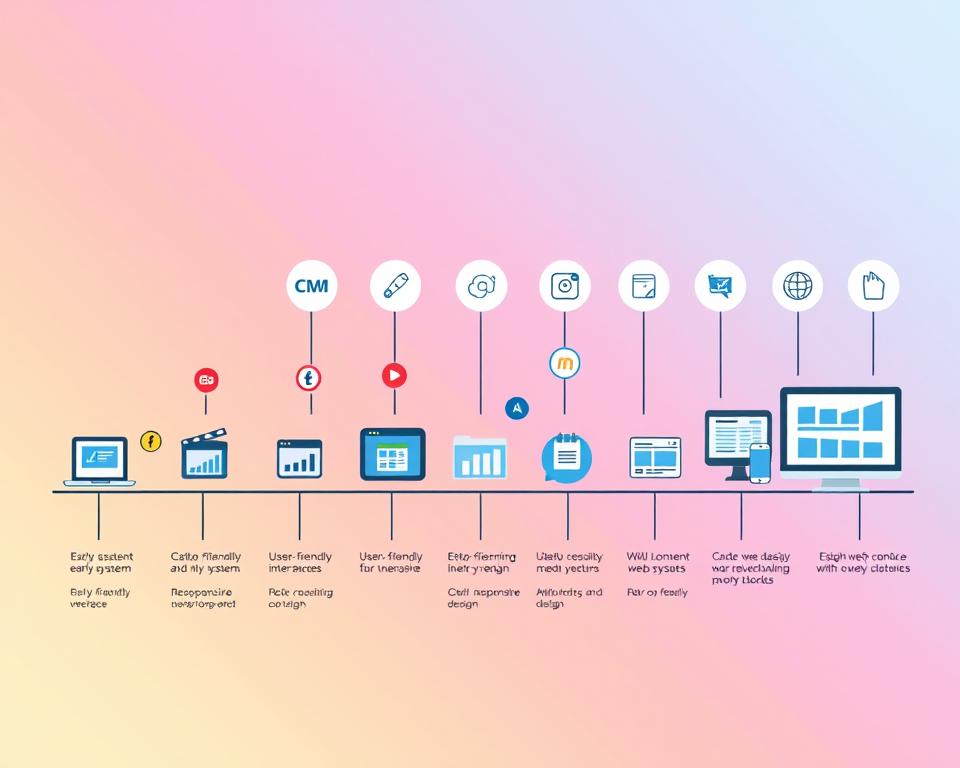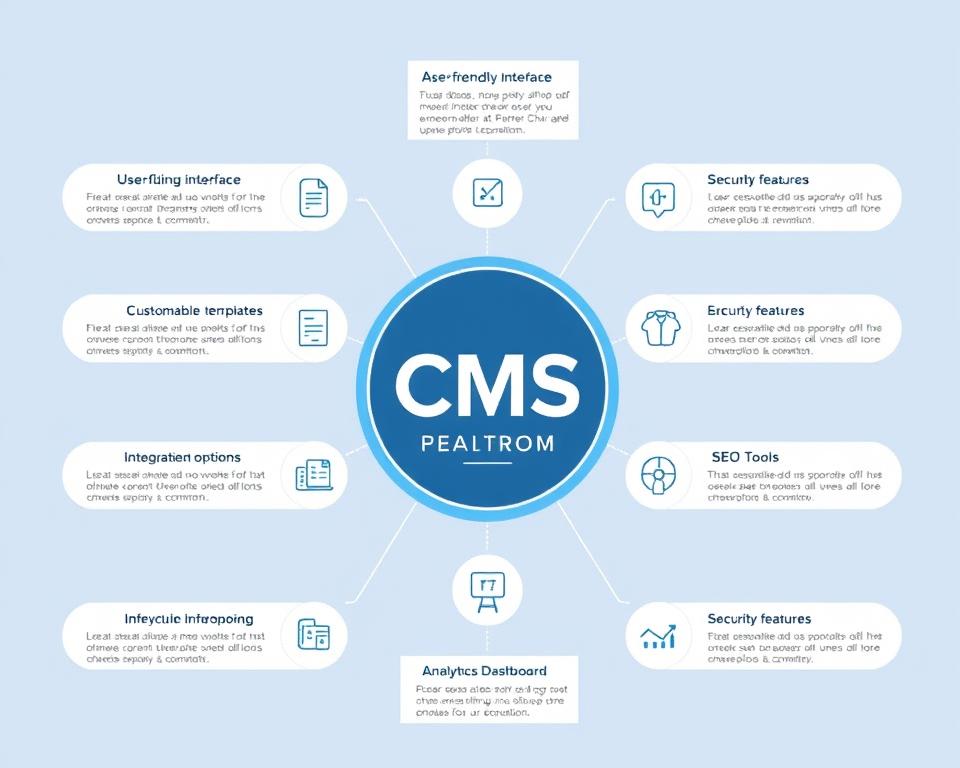In today’s fast-changing digital world, choosing the right Content Management System (CMS) is crucial. It affects how well your website works, whether you run a small business, work in marketing, or are a web developer. The right CMS can help you manage your online space better, make creating content easier, and ensure a smooth user experience.
This guide looks at the top 15+ CMS platforms. We’ll dive into their features, the good and bad sides, to help you pick the best one for your website. This will make your online presence stronger and more effective.
Table of Contents
Key Takeaways
- Discover the top 15+ CMS platforms for your website development needs
- Understand the key features, pros, and cons of each CMS platform
- Gain insights into the evolving trends and capabilities of content management systems
- Evaluate the factors to consider when selecting the right CMS for your project
- Explore the future of CMS platforms and their impact on website development
Understanding Content Management Systems (CMS) and Their Role in Modern Web Development
In today’s fast-changing web world, content management systems (CMS) are key. They help make creating, managing, and sharing digital content easier. A CMS lets users handle their website’s content, like text and images, without needing to know a lot of tech stuff.
Key Components of a CMS Platform
A CMS has important parts that work together. These parts help manage content well. They include:
- A content creation and editing interface, which makes it easy to add, change, and format content
- A content database, where all the website’s content is stored and organized
- A content delivery system, which shows the right content on the website
- User management and access controls, for managing who can do what
How CMS Platforms Transform Website Management
CMS platforms have changed how we manage websites. They make it simpler for people who aren’t tech-savvy to keep their sites up-to-date. CMS platforms keep content separate from design. This lets users focus on making and sharing great content without worrying about the tech side.
This makes managing websites easier and more flexible. It helps users keep their sites looking good and working well.
The Evolution of Content Management Systems
The start of CMS basics goes back to the early internet days. Back then, people wanted an easier way to manage website content. Since then, CMS platforms have grown a lot.
They now offer more features like e-commerce and support for many languages. CMS platforms are now a big part of web development today.
Essential Features to Look for in a CMS Platform
Choosing the right content management system (CMS) for your website is key. The best CMS can make managing your content easier, improve your site’s look and feel, and boost its performance. Here are the main features to look for in a CMS:
- Intuitive User Interface: The CMS should be easy to use. It should make creating, editing, and publishing content simple, even for those who aren’t tech-savvy.
- Scalability: Your CMS should grow with your website. It should handle both small blogs and large corporate sites.
- SEO Optimization: A good CMS should have SEO tools. These include meta tags, URL customization, and XML sitemap generation to help your site rank better in search results.
- Mobile Responsiveness: With more people using mobile devices, your CMS should make sure your site works well on all devices and screen sizes.
| CMS Feature | Importance | Benefit |
|---|---|---|
| Intuitive User Interface | High | Streamlines content management, reduces learning curve |
| Scalability | High | Accommodates website growth and evolving needs |
| SEO Optimization | High | Enhances website visibility and search engine rankings |
| Mobile Responsiveness | High | Ensures seamless user experience on mobile devices |
By looking at these key features, you can pick a CMS that meets your website’s needs. This will help you reach your online goals.
WordPress: The Most Popular CMS Platform Worldwide
WordPress is the top choice for building websites globally. It’s known for being easy to use, having lots of plugins, and customizable themes. This has changed how people and businesses show their online presence.
WordPress Plugin Ecosystem
WordPress’s big strength is its huge library of plugins. These plugins add many features to websites, like e-commerce and SEO. This lets developers make websites that fit exactly what clients need, making the process smooth and quick.
WordPress Theme Customization Options
WordPress also has a wide range of themes for different styles and industries. You can find anything from modern to traditional designs. This means users can make their websites look unique and attractive.
WordPress Security Considerations
Being the most used CMS, WordPress faces many security threats. But, it keeps getting better at protecting sites. This includes regular updates, strong access controls, and security plugins. Keeping up with WordPress’s security tips helps keep websites safe.
WordPress is loved for its easy use, vast plugin library, and theme options. It’s great for all kinds of websites, from blogs to big e-commerce sites. As the CMS world keeps changing, WordPress stays ahead, making it the top choice worldwide.
Drupal: Enterprise-Level Content Management Solution
Businesses and organizations need strong content management systems. Drupal stands out as a top choice. It’s known for organizing content well and handling big websites.
Drupal’s design lets businesses customize it for their needs. It has a great system for organizing and finding content. This makes it perfect for big websites with lots of info. Plus, it grows with your business, adapting to more content and visitors.
Drupal is also very secure, which is key for big websites. It gets regular updates and has a big community of developers. It’s also great for websites that need to reach people all over the world.
Drupal is very flexible, thanks to its many modules and themes. This lets businesses add features and make the site their own. Whether it’s for online shopping or personalizing content, Drupal has what you need.
In short, Drupal is a top pick for businesses. It’s great for organizing content, growing with your business, and keeping your site safe. It’s perfect for building a strong online presence.
Joomla: Balancing Flexibility and User-Friendly Features
Joomla is a top choice in content management systems (CMS). It’s known for its flexibility and ease of use. As an open-source CMS, Joomla has a big following. This is because of its wide range of features and many Joomla extensions available.
Joomla Extensions and Templates
Joomla’s big strength is its huge library of extensions. These extensions make it easy to add new features to websites. You can find everything from e-commerce tools to SEO and multimedia components in the Joomla extensions marketplace.
Also, Joomla’s template system offers many design options. This lets users customize their websites to match their brand perfectly.
Multi-language Support in Joomla
Joomla is great for multilingual websites. It has tools for managing languages and a strong translation system. This makes it easy to create and keep websites in many languages.
| Feature | Benefit |
|---|---|
| Joomla Extensions | Extensive library of add-ons to enhance website functionality |
| Website Customization | Flexible template system for creating a unique online presence |
| Multilingual Websites | Built-in language management tools for reaching a global audience |
Joomla is a favorite for many web projects. It’s great for both small personal sites and big enterprise platforms. Its strong features, many extensions, and support for many languages make it a top choice for anyone looking for a Joomla CMS.
Wix: Drag-and-Drop Website Building Made Simple
Wix is a standout in the world of content management systems (CMS). It’s easy for beginners to use. With its drag-and-drop interface, creating and customizing websites is simple, no tech skills needed.
Wix has a huge collection of website templates for all kinds of businesses and interests. These templates, along with Wix’s user-friendly CMS, make it perfect for small businesses and individuals. They can quickly set up a strong online presence.
“Wix is a game-changer for anyone who wants to build a professional-looking website without the hassle of coding or hiring a web developer.”
The Wix website builder has a smooth interface. Users can easily drag and drop elements, change layouts, and try out different designs. This freedom, along with Wix’s focus on the latest web design trends, makes it a favorite for those who want a beautiful and engaging website.
- Intuitive drag-and-drop interface for easy website creation
- Extensive library of website templates to suit diverse needs
- Beginner-friendly CMS for efficient website management
- Enables users to create visually stunning and responsive websites
Wix’s website builder is great for anyone, whether you run a small business, blog, or just want an online space. It’s a simple and effective way to make your digital dreams come true.
Shopify: Specialized CMS for E-commerce Websites
Shopify is a top choice for businesses wanting to start or grow their online stores. It offers a full set of tools for managing e-commerce sites. This includes easy payment setups and keeping track of inventory.
Shopify Payment Integration
Shopify stands out for its easy payment setup. It supports many payment options, like credit cards and digital wallets. This makes it easy for customers to pay, helping to boost sales.
Store Management Features
Shopify has great tools for managing online stores. It helps with tracking inventory, fulfilling orders, and reporting on sales. These tools give store owners the info they need to make smart decisions.
| Feature | Description |
|---|---|
| Inventory Tracking | Shopify’s system lets store owners keep an eye on stock levels. It alerts them when it’s low and updates stock as orders are shipped. |
| Order Fulfillment | Shopify’s tools make it easy to manage orders. This helps store owners ship orders quickly and efficiently. |
| Reporting and Analytics | Shopify’s reports give insights into sales and customer behavior. This helps store owners understand their performance and make better decisions. |
Shopify is a top choice for businesses looking to grow their online stores. Its easy payment setup and detailed management tools make it a leader in e-commerce platforms.
Ghost: Modern Publishing Platform for Professional Bloggers
Ghost is a top choice for professional bloggers and publishers. It’s known for its simplicity and elegance. This makes it easy for content creators to do their best work.
Ghost’s modern interface is designed to help you focus on writing. It has a clean dashboard and tools that make creating content easy. Plus, it has SEO optimization built in, so your articles are easy to find.
Ghost does more than just help you write. It also makes it easy to manage subscriptions. This lets bloggers earn money directly from their readers. It builds a loyal community and a steady income.
- Sleek and distraction-free writing interface
- Intuitive dashboard for easy content management
- Integrated SEO optimization tools
- Powerful subscription management capabilities
- Scalable infrastructure to support growing content creation needs
Ghost combines a modern publishing experience with great subscription and SEO optimization tools. It’s a top choice for professional content creators. Whether you’re already blogging or just starting, Ghost makes it easy to grow your online presence and connect with readers.
Squarespace: Design-Focused Website Builder
Squarespace is known for its stunning websites. It’s perfect for those who want a beautiful online space. Its templates are designed to make your site look great and work well on any device.
Template Design Options
Squarespace has many modern templates to choose from. You can find everything from simple to bold designs. It’s easy to change these templates to fit your brand and style.
E-commerce Capabilities
Squarespace is great for small businesses and solo entrepreneurs. It has tools for creating online stores. You can manage payments, stock, and shipping easily. This makes Squarespace a top choice for a complete website solution.
| Feature | Squarespace | Wix | WordPress |
|---|---|---|---|
| Visual Design | Exceptional | Good | Customizable |
| Responsive Layouts | Seamless | Good | Customizable |
| E-commerce Integration | Excellent | Good | Customizable |
Squarespace is perfect for those who want a beautiful and functional website. Its design and e-commerce features are unmatched.
HubSpot CMS Hub: Marketing-Centric Content Management
The HubSpot CMS Hub is a standout in the world of content management systems. It meets the needs of businesses looking for a complete marketing and content solution. This platform integrates well with HubSpot’s inbound marketing and CRM tools, making online presence management easier.
The HubSpot CMS Hub focuses on marketing and lead generation. It has a drag-and-drop page builder for creating attractive web pages and blogs. The advanced CRM integration ensures content is personalized for each visitor, meeting their specific needs.
- Seamless integration with HubSpot’s inbound marketing and CRM tools
- Intuitive drag-and-drop page builder for creating visually stunning web content
- Advanced CRM integration for personalized content delivery and lead generation
- Comprehensive analytics and reporting capabilities to track website performance
- Scalable and secure platform suitable for businesses of all sizes
The HubSpot CMS Hub is unique because it focuses on marketing and lead generation. It’s perfect for businesses that want to integrate their marketing and customer relationship efforts. With the HubSpot CMS, organizations can manage their content, marketing, and customer relationships better. This leads to growth and success in today’s competitive online world.
| Feature | Description |
|---|---|
| Integrated CRM | Seamless integration with HubSpot’s powerful CRM platform, enabling personalized content and targeted lead generation |
| Drag-and-Drop Page Builder | Intuitive interface for creating visually appealing and conversion-optimized web pages, blogs, and landing pages |
| Advanced Analytics | Comprehensive reporting and analytics tools to track website performance, visitor engagement, and marketing ROI |
| Secure and Scalable | Robust security measures and scalable infrastructure to support businesses of all sizes |
Comparing Open Source vs. Proprietary CMS Platforms
Choosing a content management system (CMS) for your website is a big decision. You have to decide between open-source and proprietary platforms. Each has its own benefits, and knowing the differences can help you pick the right one for your needs and budget.
Cost Considerations
Open-source CMS platforms like WordPress, Drupal, and Joomla are free to use. But, the total cost can change based on hosting, upkeep, and customizations. Proprietary platforms, however, might cost more upfront. They often have more support and features ready to go.
Customization Options
- Open-source CMS platforms let you change the code and add custom features. This is great for those who need specific solutions.
- Proprietary platforms might not be as customizable. But, they offer many pre-made templates and integrations. This makes them good for businesses that don’t have a lot of technical know-how.
Choosing between open-source and proprietary CMS platforms depends on your organization’s needs and goals. Weighing the pros and cons of each can help you make the best choice for your website.
“The choice between open-source and proprietary CMS platforms is not a one-size-fits-all decision. It’s crucial to evaluate your specific requirements, budget, and technical expertise to find the solution that will best serve your website and business needs.”
Security Considerations When Choosing a CMS Platform
When picking a content management system (CMS) for your site, security is key. A secure CMS protects your site, user data, and business from cyber threats. Here are important security factors to think about:
- Regular Updates and Patches: Make sure the CMS you choose gets regular security updates. Old software can make your site vulnerable to attacks.
- User Authentication and Access Control: Find a CMS with strong user login methods, like two-factor authentication. This helps stop unauthorized access to your site’s backend.
- Data Encryption and SSL Certificates: Check if the CMS supports data encryption and SSL certificates. These secure data between your site and users.
- Third-Party Extensions and Plugins: Be careful with third-party tools you add. They can be risky if not updated regularly.
- Backup and Disaster Recovery: Choose a CMS with good backup and disaster recovery options. This protects your site and data from security breaches or other issues.
Putting security first in your CMS choice helps protect your site, user data, and business. A secure CMS is essential for your online success and safety.
| Security Feature | Importance | Best Practices |
|---|---|---|
| Regular Updates and Patches | High | Ensure the CMS platform is kept up-to-date with the latest security fixes and bug patches. |
| User Authentication and Access Control | High | Implement robust user authentication methods, such as two-factor authentication, to prevent unauthorized access. |
| Data Encryption and SSL Certificates | High | Verify the CMS platform supports data encryption and SSL/TLS certificates to secure website communication. |
| Third-Party Extensions and Plugins | Medium | Carefully review and vet any third-party extensions or plugins before installing them on the CMS platform. |
| Backup and Disaster Recovery | High | Ensure the CMS platform offers reliable backup and disaster recovery capabilities to protect your website and data. |
Conclusion
Choosing the right content management system (CMS) is key for your website’s success. The CMS you pick affects your website’s functionality, user experience, and growth. It’s a crucial decision for your online presence.
When looking at CMS platforms, think about your business needs and goals. Consider how easy it is to use, how customizable it is, and its security features. Also, look at the plugins and extensions available to improve your site.
The CMS you choose is the backbone of your website. It should fit your digital strategy and offer the tools you need to manage and grow your online presence.
| CMS Platform | Strengths | Weaknesses |
|---|---|---|
| WordPress |
|
|
| Drupal |
|
|
| Joomla |
|
|
Understanding your website needs and goals is crucial for choosing the right CMS. By doing your research, you can make a choice that will help your business thrive. Invest in a solid CMS foundation for a successful digital strategy.
Future Trends in Content Management Systems
The digital world is always changing, and so are content management systems (CMS). Soon, CMS will use new technologies to change how we manage and share web content. AI-powered CMS will use artificial intelligence to help create, sort, and improve content. This will make everything more efficient and tailored for each user.
Headless CMS architectures are also becoming more popular. These systems split content management from the front-end display. This makes them more flexible, scalable, and ready for new platforms like PWAs and voice-activated interfaces. It’s all about delivering content everywhere, smoothly, on any device.
Integrating CMS with PWAs will change how we interact with web content. PWAs offer a mobile app-like experience but are accessible online. This means faster, more interactive content for everyone. CMS platforms will make this possible, offering better user experiences.
Optimizing CMS for voice search is another key trend. With more voice-controlled devices around, CMS needs to adapt. It must make content easy to find with voice commands. This means improving content structure and metadata for better voice search experiences.



















